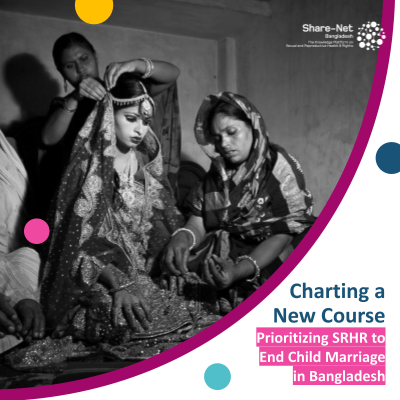Charting a New Course: Prioritizing SRHR to End Child Marriage in Bangladesh
“Child marriage is not just a violation of human rights; it’s a barrier to development.” – UNICEF
Bangladesh, despite legal frameworks and advocacy efforts, continues to grapple with the harrowing reality of child marriage. Recent data from the Bangladesh Sample Vital Statistics (SVRS) 2023 and Bangladesh Demographic and Health Survey (BDHS) 2022 paints a distressing picture, with 41.6% of girls married under 18 and 8.2% married under the age of 15. These statistics not only reflect a societal failure but also highlight the urgent need for a paradigm shift in our approach towards combating this deeply entrenched issue.
Child marriage not only violates the fundamental rights of young girls but also undermines their sexual and reproductive health and rights (SRHR), perpetuating a cycle of intergenerational poverty and gender inequality. But, despite legislative measures like the Child Marriage Restraint Act of 2017 and the National Plan of Action to End Child Marriage (2018-2030), the prevalence of child marriage persists, indicating a significant gap between policy intent and ground realities. The root causes are multifaceted, ranging from socio-cultural norms to economic vulnerabilities and educational shortcomings.
One glaring issue is the clandestine registration of underage marriages, perpetuated by loopholes in the system and economic pressures on marriage registrars. While officially, marriages under 18 are declined registration, alternative methods such as notary marriage or false age declarations evade legal scrutiny, leaving young girls vulnerable to exploitation and devoid of legal protections. This pseudo-reality not only undermines the efficacy of existing laws but also perpetuates a cycle of vulnerability and marginalization. Also, the prevalence of child marriage in Bangladesh reflects a systemic failure to safeguard the sexual rights and reproductive health of adolescents, hindering progress towards achieving broader development goals.
The COVID-19 pandemic has exacerbated these trends, with prolonged school closures leading to a loss of awareness on girls’ rights and the value of education. Moreover, the rise of digital technology has introduced new challenges, with adolescents engaging in internet romances that often culminate in premature marriages. The agency of adolescents, aided by digital platforms, has emerged as a significant driver of child marriage, necessitating a reevaluation of our educational systems and societal norms.
The state minister for women’s and children’s affairs aptly summarizes this concern, noting instances of underage brides and grooms in her constituency, Kapasia. This underscores the urgent need for holistic interventions that address not only legal enforcement but also educational reform and societal attitudes towards gender equality. Addressing the root causes of child marriage requires a comprehensive approach that prioritizes education, economic empowerment, and access to SRHR services, empowering young girls to make informed choices about their bodies and futures.
To effectively combat child marriage, we must adopt a new narrative that transcends punitive measures and embraces comprehensive solutions. This entails bridging the gap between policy intent and implementation, addressing systemic issues such as economic disparities and educational inequities, and empowering adolescents with the knowledge and agency to make informed choices about their lives. Moreover, the clandestine registration of underage marriages underscores the urgent need for legal reforms that strengthen protections for girls and uphold their reproductive rights, ensuring that no child is forced into early marriage against their will.
Radical policy prescriptions, including making secondary education compulsory, and honest soul-searching on the reorientation of education are imperative steps towards building a future where girls and boys alike can thrive free from the shackles of child marriage. It is time to move beyond rhetoric and confront the stark realities facing our society, ensuring a brighter and more equitable future for the next generation. By reframing the narrative on child marriage to center on SRHR and gender equality, we can foster a society where every individual has the agency to exercise their sexual and reproductive rights free from coercion and discrimination.
Source: The Daily Star
Source Contributor: Hossain Zillur Rahman, Economist and Political Sociologist, Executive Chairman, Power and Participation Research Centre (PPRC)


